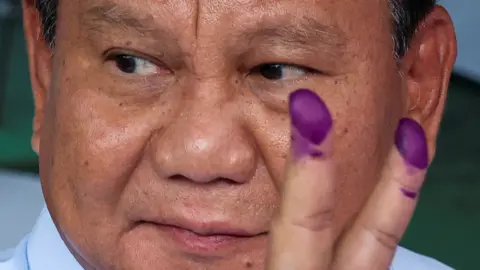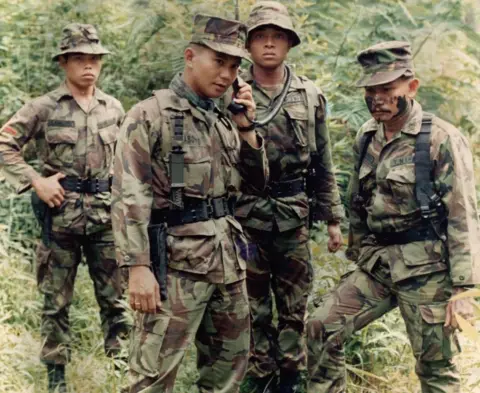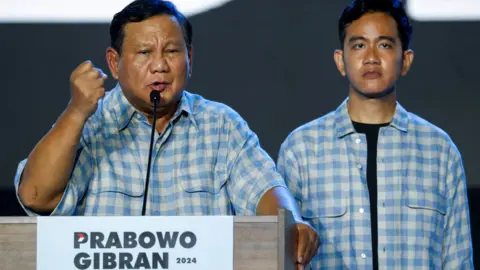Prabowo Subianto: The tainted ex-military chief who will be Indonesia's new leader
 Reuters
ReutersAfter two failed attempts, Prabowo Subianto has finally clawed his way into Indonesia's ultimate seat of power.
The ex-military general, accused of rights abuses and war crimes during the dark days of the Suharto regime, has triumphed in a modern-day democratic vote.
Gone were the inflammatory, nationalist comments of his previous presidential runs; in the 2024 election he sold himself as a cute grandpa on TikTok, flashing heart signs and doddering around with a viral dance.
It worked for younger voters - a generation poorly informed of the country's past under a military dictatorship.
Some on voting day even told the BBC they wanted a strongman in office - someone to carry on the policies of the widely adored outgoing President Joko 'Jokowi' Widodo.
But others fear that the return of a military general - someone who was the son-in-law of Dictator Suharto - spells a slide back into dark days.
A privileged upbringing and dark past
The 72-year-old has a shocking human rights record according to both local and international rights observers.
He is most notorious for allegations he commanded a unit which abducted and tortured several democracy activists during the dying days of the Suharto regime in the late 1990s. Of the 23, some survived, one died and 13 remain missing.
He was fired from the army following this and went into self-exile in Jordan in the 2000s.
But he returned to Indonesia a few years later, building up his wealth in palm oil and mining before making the jump to politics.
It was a space he felt entitled to, some might say. Prabowo is a political blue blood, born into an elite family embedded in Indonesian politics.
His father was a renowned economist who held several trade and finance ministerships, and his grandfather formed the first state-owned bank in the country.
During his childhood he and his family lived in exile in Switzerland and England, after his father was accused of involvement with separatist groups in Sumatra.
When he returned to Indonesia in 1970, he enlisted in the military where he quickly rose up the ranks.
In the 1980s, he did several tours with a special forces unit fighting separatists in East Timor, now the country of Timor-Leste. Witnesses accuse him of committing atrocities both there and in Papua.
During this period he also moved into Suharto's inner sanctum, marrying in 1983 one of the former dictator's daughters, Siti Hediati Hariyadi. Their marriage lasted 15 years, ending around the same time of the regime's collapse.
Prabowo at this time was commander of a special forces unit accused of the activists' abductions. While he was sacked, charges were never brought against him.
He later admitted to the kidnapping of those who survived; but the families of the missing are still protesting for answers.
In the chaotic last days of Suharto, he also instigated race riots in the capital Jakarta, directing anger at the Chinese ethnic minority, critics say. He has always denied these allegations.
After Suharto's fall, he fled to Jordan, keeping a low profile as Indonesia pulled itself into a democratic age in the new millennium.
The ex-military figure was banned from entering the US and Australia at this point, on a blacklist for his human rights record. That ban was lifted only in recent years.
 Prabowo Subianto/FB
Prabowo Subianto/FBPrabowo made his comeback shortly before the 2004 elections, starting his own party and then dealing with coalitions to get his foot on the ladder.
In 2014 and 2019, he went head-to-head against his bitter enemy Jokowi in fierce presidential races. He lost both times.
But after violent protests from his supporters in the wake of his loss in 2019 - 10 people died in riots - Jokowi made a deal, bringing him into his government and installing him as defence minister.
He was free to travel then - from Paris to Washington and Beijing - as a senior Indonesian official. The Western sanctions vanished.
Rights advocates at the time warned how his elevation into a senior position legitimised his position in Indonesian governance.
"Prabowo's appointment sends a worrying signal that our leaders have forgotten the darkest days and the worst violations committed in the Suharto era," Amnesty International's Indonesia director Usman Hamid said at the time.
"When Prabowo was at the helm of our special forces, activists disappeared and there were numerous allegations of torture and other ill-treatment."
Prabowo has been pressed several times on his dark past. He denies most of the accusations and when he does admit to a crime - like the abductions - he falls back on the classic soldier defence: that he was only taking orders.
"It was my superiors who told me what to do," he said during one presidential debate in 2014.
His rebranding for the 2024 vote was one part of the winning strategy.
But most crucially he received the backing of his former enemy, Jokowi, when the outgoing leader put his son on Prabowo's ticket.
Indonesia's Constitutional Court had to amend electoral rules in allowing the 36-year-old Gibran Rakabuming Raka to be the vice-presidential running mate for Prabowo. Previously, only those aged over 40 were eligible. Jokowi's brother-in-law is the Chief Justice on the court and cast the deciding vote.
 Reuters
ReutersProtesters in the lead up to Wednesday's election accused Jokowi of abuse of power and electoral interference. They argue he just wanted to retain his influence in politics.
It was a good deal for Prabowo. Many voters told the BBC they trusted whomever Jokowi endorsed.
On Wednesday, the unofficial tallies showed this strategy had worked. Prabowo pulled ahead quickly in the counting, with nearly 60% of the vote in the first round, precluding any need for a run-off.
During his victory speech he addressed thousands of supporters in the stadium, making light references to the past. He reminisced about his lunches with Suharto.
A leader from that era has now returned to power in Indonesia.
For many freedom fighters, what was once unthinkable has come to pass.
